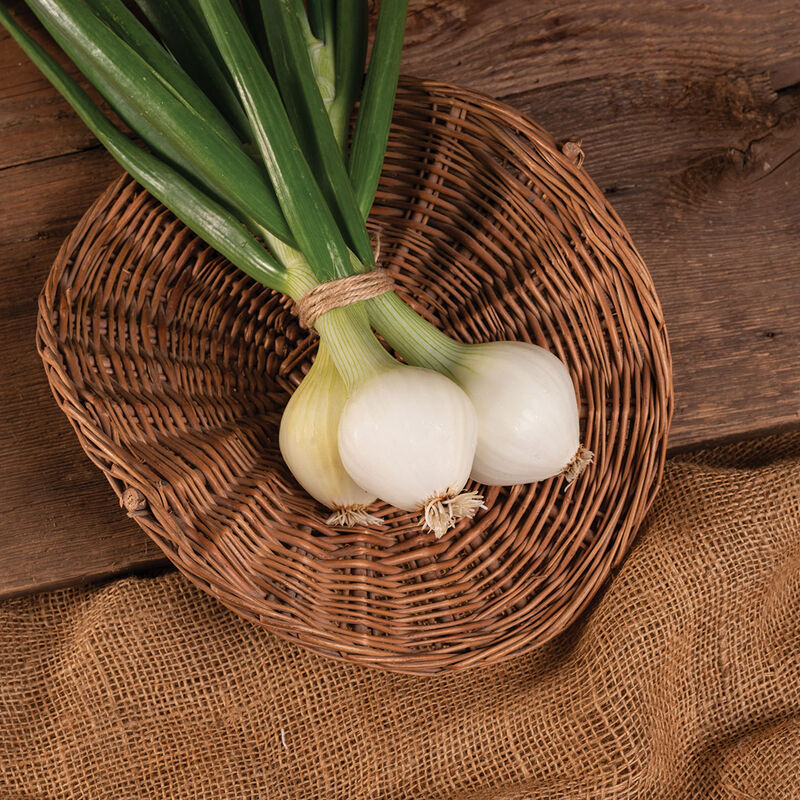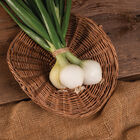T-448 (F1) Onion Seed
T-448 (F1) Onion Seed
Earliest long-day overwintering onion for the North.
Our trials have shown T-448 to be larger and about a week earlier than Bridger when overwintered. Bulbs are also more rounded in shape. Not as early or as large as Bridger when spring sown, however. Exceptional bolt tolerance when overwintered.Specs:
- This product does not ship to the following countries: United Arab Emirates, Austria, Australia, Barbados, Belgium, Bulgaria, Bermuda, Bahamas, Switzerland, Cyprus, Czech Republic, Germany, Denmark, Estonia, Spain, Finland, France, United Kingdom, Greece, Hong Kong, Croatia, Hungary, Ireland, Iceland, Italy, Japan, Republic of Korea, Kuwait, Cayman Islands, Lithuania, Luxembourg, Latvia, Malta, Netherlands, Norway, New Zealand, Oman, Poland, Portugal, Qatar, Romania, Saudi Arabia, Sweden, Singapore, Slovenia, Slovakia, San Marino, Thailand, Trinidad and Tobago, Taiwan, Ukraine.
SCIENTIFIC NAME:
Allium cepaCULTURE:
Onions require full sun and fertile, well-drained soil with a pH of 6.0–7.0. Sandy loam soils are ideal; in heavier soils, use raised beds or raised rows to promote soil drainage.DAY LENGTH:
Onion bulbing is triggered by day length, and maximum day length during the growing season increases from south to north. Short-day onions are grown at lower latitudes in the South, while intermediate and long-day onions are grown at higher latitudes. Refer to "Adaptation" in each variety description for details.DAYS TO MATURITY:
From direct seeding; subtract 10–15 days for days to maturity from transplant. TRANSPLANTING: In long- and intermediate-day areas, sow indoors 6–8 weeks before last frost date. Sow 128-cell trays, 1 seed/cell, and cover with 1/4" soil. Transplant 4" apart in rows 12–18" apart. Unruly tops may be clipped to 5" at time of transplant.DIRECT SEEDING:
In April or early May, or as soon as the soil can be prepared in early spring, sow in a 2" wide band, about 2 seeds/in., 1/4– 1/2" deep, rows 12–18" apart. Thin to 1 1/2–2" apart for highest yields in fertile soil. Thin to 3-4" apart for larger onions.AVG. DIRECT SEEDING RATE:
1 oz./25', 1M/50', 5M/250', 25M/1,250', 580M/acre at 20 seeds/ft., in rows 18" apart.CROP MAINTENANCE:
Keep onions well weeded with shallow cultivation. Onions are shallow-rooted and grow best with at least 1" per week of rain or irrigation, especially during the bulbing phase.DISEASE:
Adequate air circulation and crop rotation aids in reducing the risk of foliar disease.HARVEST:
When necks become soft and 50% of tops are falling over, pull and cure in well-ventilated space out of direct sunlight (to prevent greening) or sun-cure in field for 2–7 dry days before moving to dry location. Cure until tops are completely dried; about 2 weeks.STORAGE:
When dry, clip off tops and roots and store in onion bags or shallow boxes at near freezing and 65–70% humidity.TRANSPLANTS:
Avg. 1 oz./4,900 plants, 1 lb./78,750.SIZED SEEDS:
Standard on all varieties.SEEDS/LB.: 96,900–127,700 (avg. 112,000).PACKET:
250 seeds, sows 12' or makes 140 plants.Johnny's is committed to your success, every step of the way.
We want you, our customer, to be 100% satisfied with all of our seeds, tools, and supplies.
If anything you purchase from us proves unsatisfactory, we will either replace the item or refund the purchase price.




